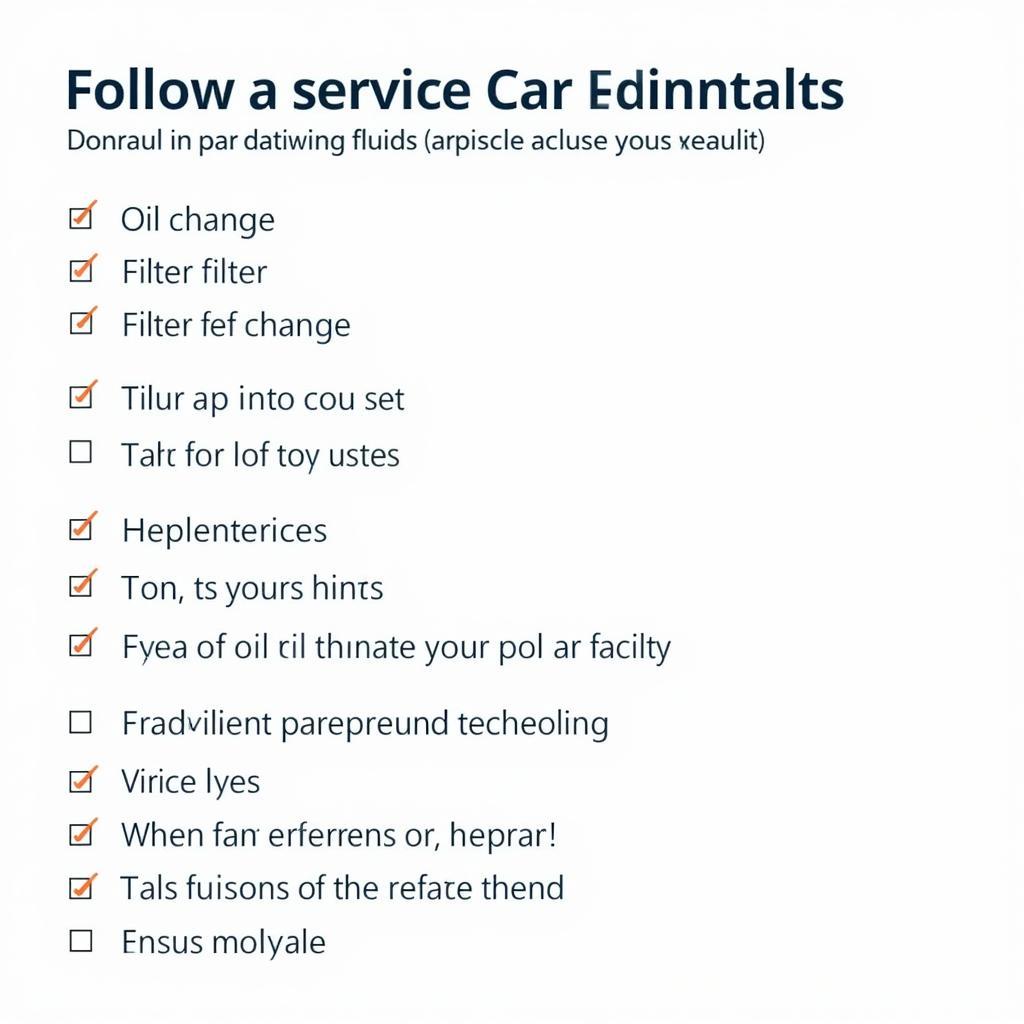How Often to Get My Car Serviced? A Comprehensive Guide
Knowing how often to service your car can feel like deciphering ancient hieroglyphics. Don’t worry, you’re not alone! It’s a question that puzzles many car owners. This comprehensive guide will walk you through everything you need to know about car servicing intervals, helping you keep your vehicle in tip-top shape and avoid those dreaded roadside breakdowns.
Decoding the Service Schedule Mystery
The first and most crucial step in determining your car’s service needs is to consult your owner’s manual. Think of it as your car’s personal instruction booklet. Inside, you’ll find a detailed service schedule specifically tailored to your make and model.
This schedule outlines the recommended intervals for various maintenance tasks, like:
- Oil Changes: The lifeblood of your engine, regular oil changes are crucial for lubrication and preventing premature wear and tear.
- Filter Replacements: From air filters to cabin filters, these components keep your engine running smoothly and the air you breathe clean.
- Spark Plug Checks: Essential for ignition, worn-out spark plugs can lead to decreased fuel efficiency and engine performance.
- Fluid Top-Ups: Maintaining proper fluid levels (brake fluid, coolant, transmission fluid) is essential for your car’s overall health and safety.
 Car Service Checklist
Car Service Checklist
Factors Influencing Service Intervals
While your owner’s manual provides a general guideline, several factors can influence how often your car needs a service:
1. Driving Conditions: Do you frequently navigate city traffic or dusty country roads? Harsh driving conditions can put extra strain on your vehicle, requiring more frequent servicing.
2. Driving Style: Aggressive acceleration and braking can accelerate wear and tear on your car’s components, necessitating earlier service appointments.
3. Vehicle Age and Mileage: As your car racks up miles, its parts naturally experience wear and tear, requiring more frequent maintenance and inspections.
4. Climate: Extreme temperatures, whether scorching hot or freezing cold, can impact your car’s battery, fluids, and tire pressure, making regular check-ups even more critical.
 Mechanic Inspecting Car
Mechanic Inspecting Car
Time vs. Mileage: Which One Wins?
You’ll often see service recommendations based on both time and mileage. For example, your manual might suggest an oil change every 6 months or 5,000 miles, whichever comes first. But why both?
-
Time-Based Servicing: Even if you don’t drive frequently, fluids can degrade over time, and rubber components can become brittle. Time-based servicing ensures these crucial elements are checked and replaced as needed.
-
Mileage-Based Servicing: The more you drive, the more wear and tear your car experiences. Mileage-based servicing addresses the direct impact of usage on your vehicle’s components.
Warning Signs Your Car Needs a Service ASAP
While adhering to your car’s service schedule is vital, unexpected issues can arise. Keep an eye out for these telltale signs that your car needs some immediate TLC:
- Unusual Noises: Strange clunking, grinding, squealing, or hissing sounds are often your car’s way of crying for help. Don’t ignore them!
- Warning Lights: Those illuminated icons on your dashboard are more than just pretty lights—they’re trying to tell you something. Get any warning lights checked out promptly.
- Fluid Leaks: Unexplained puddles beneath your car? It could indicate a fluid leak that needs immediate attention.
- Performance Issues: Experiencing sluggish acceleration, difficulty starting, or reduced fuel efficiency? These are all signs your car might need a service.
 Car Warning Lights
Car Warning Lights
The Benefits of Regular Car Servicing
Investing in regular car servicing offers a host of benefits beyond just keeping your vehicle running smoothly:
1. Safety First: Regular servicing ensures your car’s brakes, tires, and other safety-critical components are in optimal condition, providing peace of mind on the road.
2. Prevent Costly Repairs: Catching minor issues early through regular servicing can help prevent them from escalating into major, wallet-draining repairs down the line.
3. Improved Fuel Efficiency: A well-maintained engine runs more efficiently, saving you money at the pump and reducing your carbon footprint.
4. Extended Vehicle Lifespan: Consistent care and maintenance can significantly extend the life of your car, maximizing your investment.
5. Higher Resale Value: A well-documented service history adds credibility and increases the resale value of your vehicle when it’s time to upgrade.
How Often Should I Get My Car Serviced UK
In the UK, the standard recommendation for car servicing is every 12,000 miles or 12 months, whichever comes first. However, as we’ve discussed, this can vary depending on your car’s make and model, your driving habits, and other factors.
For more detailed information specific to the UK, you can check out our comprehensive guide on how often should i get my car serviced uk.
Conclusion
Knowing how often to get your car serviced is essential for its longevity, performance, and your safety. While your owner’s manual is your ultimate guide, remember to consider your driving habits and any warning signs your car might be sending.
Regular servicing is an investment that pays off in the long run, keeping you safely on the road and potentially saving you from costly headaches down the line. If you’re unsure about your car’s service needs, don’t hesitate to consult a qualified mechanic for expert advice.

